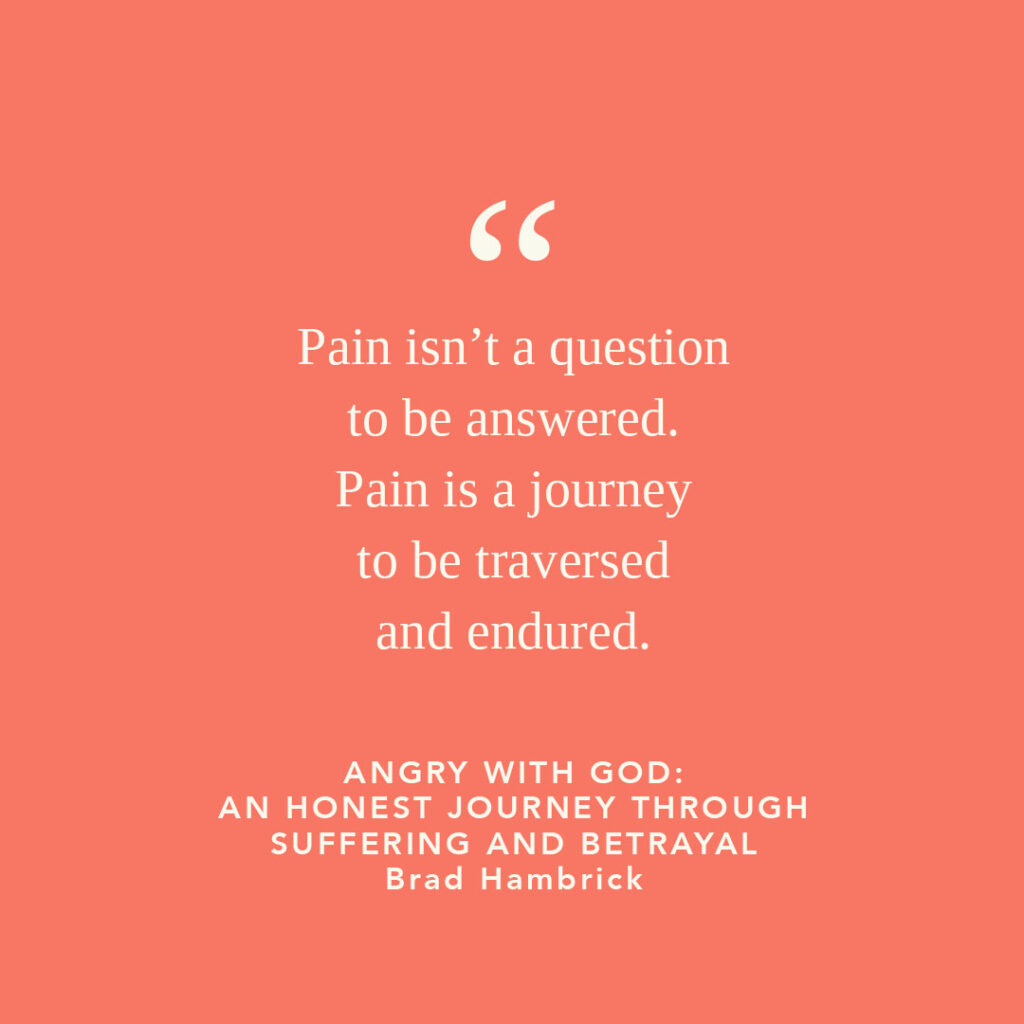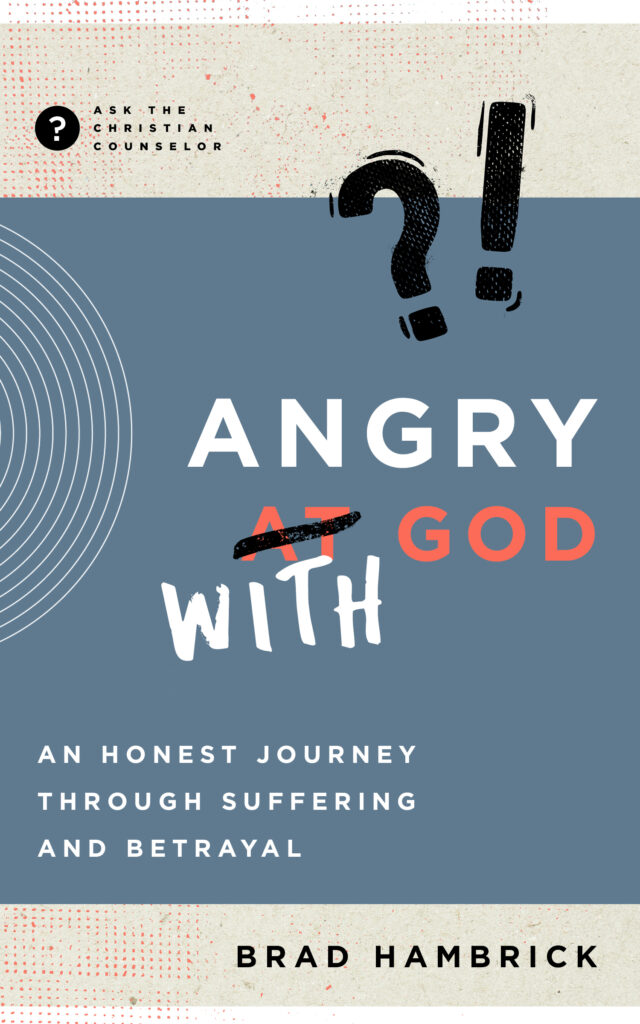No one gets mad at God for something small. When we’re angry with God, it is because we’ve faced something immensely hard. Anger is an often-overlooked part of grieving, and as such, is an appropriate response to profoundly painful events. In Angry with God: An Honest Journey through Suffering and Betrayal, counselor Brad Hambrick provides readers with a guided process to being honest with God about their pain in order to restore and deepen their relationship with him.
In this interview with Brad, we dig into his book and how anger often grows out of our grief.
Q: Is this book more about anger or grief? The title sounds like anger, but the subtitle sounds like grief and suffering.
The answer is “yes.” This is a book about grief, but a neglected phase of grief is when we experience anger. Too often we only think of the sadness in grief. We might call that “gray grief.” But anyone who has grieved a major loss (whether the passing of a loved one, a tragedy of another sort, an unwanted life transition, or comparable experience) knows that grief can also have flashes of “red.” That is, when we’re grieving there is an innate sense that “This is not how life is supposed to be!” Angry with God helps readers navigate this part of the grief experience, a part of grief in which many people get stuck.
Q: Right off the bat, you write that being angry at God reveals something quite good about us. What does our anger reveal about us, and how can that possibly be good?
No one gets mad at God for silly reasons, such as, “I wish I had blonde hair instead of brown.” When we’re angry with God, it is because we’ve faced something immensely painful. Despite our hesitancy to admit how we feel, being angry at God reveals something quite good about us. It reveals that God is important to us. We don’t get and stay angry at inconsequential people in our lives. Often, we wish we cared less about God because we have a sense that it would abate the turmoil in our soul. But it is hard to care less about someone as significant as God.
If you feel safe acknowledging (1) you are hurting, and (2) God is important to you, this opens a number of possibilities. But don’t feel rushed by the “if.” As you read through this book, if you feel too much ground is being covered too quickly, pause. If you were rehabbing an ankle injury and had a sharp pain, you would take a break. Same thing here. The goal is recovery. The pace of recovery is determined by what facilitates your journey best.
Q: What is the difference between being angry at God and being angry with God?
When we’re angry at God, we view God has an enemy or opponent in a debate. It is as if we are face-to-face with God in an argument. One of us will win and one of us will lose. For Christians, viewing God as an adversary is very disorienting. But in our angry grief, we’re not sure how else to feel. Something is wrong, it requires an answer, and God is the only one who can give it to us, so we bang on the doors of heaven demanding that our suffering be explained.
Being angry with God is different. When we’re angry with God, we’re not face-to-face with him in debate. Instead, we are side-by-side, like on a park bench. We’re not arguing; we’re talking. God is not defending. God is supporting. God becomes a friend and a refuge.
Angry with God is a journey. The journey begins with admitting we’re angry at God, if that is how we feel. But as you journey through the pages of this book, you are invited to be vulnerable with God, yourself, and hopefully a good friend as you move from being angry at God to being angry with God by sharing your pain with him to receive his comfort.
Q: Why do most Christians who abandon their faith turn their back on God? Can you explain how angry grief (which calls for comfort) is morally different from selfish anger (which calls for repentance)? What makes anger a moral emotion?
Many of us only have a mental category for selfish anger. We usually don’t think about grief anger until we are going through something tragic of painful. Emotionally tumultuous times are difficult times to orient ourselves to a new category. It may be helpful to differentiate these two types of anger.
- Selfish Anger—This is the James 4 reaction to not getting our way. It reveals a heart that puts loving self before loving God and loving neighbor. It is anger that says, “I want what I want bad enough that I’m willing to sin against you to get it.”
- Grief Anger—This is a Psalm 44 response to living a broken world. It reveals a heart that is confused and disoriented because life doesn’t seem to be playing by the rules. It is an anger that says, “I’m hurt, confused, and raw. I can’t pretend everything is okay.”
I Corinthians 15:26 says that death is the last enemy that will be destroyed. The language of enemy explains the role of anger in grief. During grief, our anger is affirming, “Yes, Lord, what prompted my pain is an enemy that needs to be destroyed. If your will were done on earth as it is in heaven, this would not be happening.”
This is why grief can have flashes of red (angry) and not be purely gray (sad). When we don’t see the role of anger in grief, we often stagnate in the anger phase of grief. We feel like God is against our anger, but we can’t say what happened was okay. We feel like our fellow Christians are naïve to what we’re going through because their expectation of faith seems hyper-positive. As a result, Christianity no longer feels like it can account for our experience.
God isn’t against our grief anger. He invites our mourning (Matthew 5:4). Many of our fellow Christians are not naïve to the experience of pain (some are) and would “weep with those who weep” (Romans 12:15), even hot tears. Christianity has far more grit than many of us have had to mine before we go through seasons of intense pain.
Q: You discuss how anger is often a secondary emotion in a situation. What is a primary and secondary emotion, and why does anger come across as the problem that needs to be address?
As we try to understand what occurs when we get stuck in the angry phase of grief, it can be helpful to differentiate primary and secondary emotions.
- Primary emotions are how we feel about an event, experience, or situation.
- Secondary emotions are how we feel about our primary emotions.
Let’s take a common case study. Imagine a parent playing with their children in the yard. One of the children begins to move toward a busy street. How does the parent feel about the situation where their child is at risk? Afraid. That is their primary emotion. How does the parent feel about being afraid for their child’s safety? Angry. That is their secondary emotion.
This brief vignette helps illustrate several distinctions between primary and secondary emotions.
- Primary emotions tend to be our more vulnerable emotions.
- Secondary emotions tend be stronger, self-protective emotions.
- Primary emotions are often less obvious to onlookers.
- Secondary emotions get the attention.
- When people focus on our primary emotions, we feel cared for and understood.
- When people focus on our secondary emotions, we feel judged and misunderstood.
Let’s return to our case study. If you asked the child intercepted from the busy street, “At this moment, do you think your parent is angry or afraid?” chances are, the child would respond, “Angry,” because the tone and volume of the parent’s secondary emotion would have come through as they yelled, “Stop!”
If you confronted the parent for being angry, the parent would get indignant. “What am I supposed to do, just let them run in the street? Am I supposed to stay calm when my child is in danger?” However, if you said, “I know it’s scary for your child to be in danger, but they’re safe now. Take a deep breath,” you could deliver the same message—relax—and get a much more receptive response.
Q: In the section on resolving your grief, you write about valuing a less innocent faith. What does a healthy-but-less-innocent faith look like, and how do we cultivate it?
Let’s start by defining innocence. When we watch children play and think, They’re so innocent, what are we observing that elicits this reaction? One dimension of their innocence is their innate sense of safety that allows them to play as if everything will be okay, a sense that life is fair and the future will be good.
One reason this innocence stands out to us as adults is that we’ve lost it. We don’t live with an innate sense of safety. We know it takes a lot of hard work and a bit of good fortune for things to turn out okay. We outgrew the idea that life is fair a long time ago. All of this is normal adulthood, adulthood without the painful experiences that would make us angry with God.
This loss of innocence goes by another name: maturity. Maturity is a good thing. While innocence meant we lived fully in the moment without a care in the world, maturity means we anticipate problems, plan for the future, and learn to respond wisely to the unfairness that exists in a broken world. Maturity is resourceful, observant, and anticipatory.
Faith can get disoriented in the transition from innocence to maturity. One reason this transition can be so hard is that faith is often equated with a naïve innocence that is blindly optimistic about any hard situation.
We can affirm that less innocent faith is not less good or less strong faith. It may be more cautious. However, the degree to which our faith honors God is not diminished simply because it lacks the innocence that was present before our painful experience.
Let’s use a biblical parallel. Do you remember the story of the widow’s mite (Luke 21:1–4)? Jesus said that the poor widow’s gift, although small, was great in value because it was given at greater sacrifice. When faith is expressed out of trust-poverty, a comparable principle is active. God knows and appreciates the sacrifice from which our faith is given. What some might see as a larger expression of innocent faith is not more precious in God’s sight than the smaller expression of less innocent faith.
Q: Why should we be diligent not to treat our pain as a riddle?
When we’re angry with God, there may be no question we ask more than “Why?” and nothing we like less than people’s attempt to answer. The disorientation of painful experiences naturally takes the form of questions: Why did my child/sibling die? Why did my spouse leave? Why was that ministry leader so duplicitous? Why did my business partner betray me? Why ___________?
It is as natural to ask why after painful experiences as it is for us to pull our hand back from a searing hot pan. Putting our pain in the form of a question invites those around us to put the remedy (if that’s what we’re looking for) in the form of an answer. But answers may be both unsatisfying and offensive. Life is never as simple as the theological formulas we’re given to reconcile the goodness of God, the power of God, and the presence of evil. Even if our Christian friends are right, their answers may not be helpful.
That’s why I’m saying, “Your pain is not a riddle.” Riddles have answers. Riddles start as puzzling questions. With a little deduction, the answer becomes clear. Once we see the answer, we can’t unsee it. Once we know the answer, the riddle loses all its angst. It’s solved.
When we approach pain like a riddle, we keep waiting for the answer that will disempower our pain. Usually, we expect the answer to come in one of two forms: (1) what we have done that is so bad to deserve this pain, or (2) what God is doing that is so good that justifies this pain. Most of our friends’ responses are speculations in one of these two directions.
We can get locked into a discussion of “Why do bad things happen to good people?” The gotcha retort might be, “That only happened once [Jesus on the cross as the only fully innocent person to suffer], and he volunteered.” That may be a great line in a sermon, but it doesn’t answer the experience of suffering in a way that creates relief as an answer does for a riddle.
There is a clear reason it doesn’t satisfy. Pain isn’t a riddle. Pain is an experience to be processed and assimilated. Pain isn’t a question to be answered. Pain is a journey to be traversed and endured. Trying to resolve pain with an answer is like trying to resolve appendicitis by explaining what caused the inflammation. The explanation may be accurate, but it’s not helpful.
Angry with God: An Honest Journey through Suffering and Betrayal
No one gets mad at God for something small. When we’re angry with God, it is because we’ve faced something immensely hard. Anger is an often-overlooked part of grieving, and as such, is an appropriate response to profoundly painful events. Counselor Brad Hambrick provides a guided process to being honest with God about your pain to restore and deepen your relationship with him.







